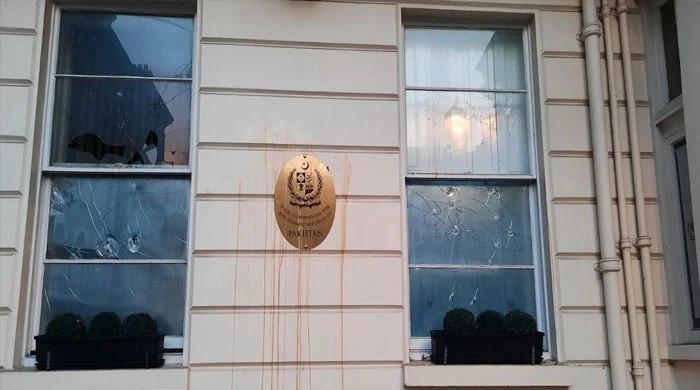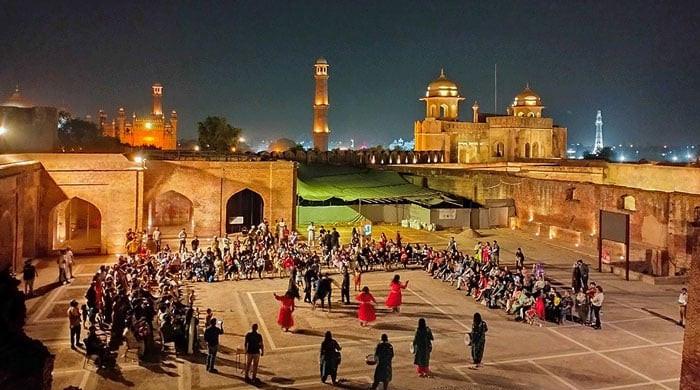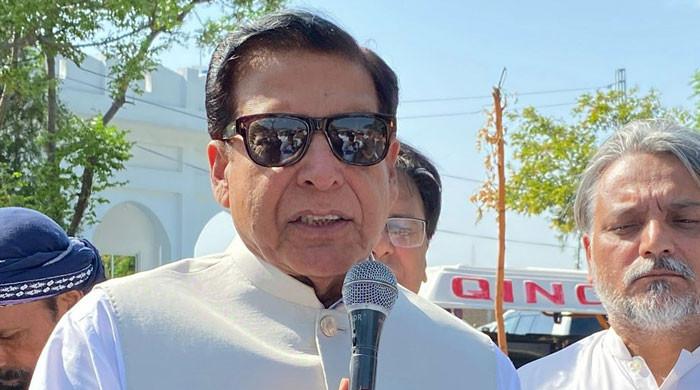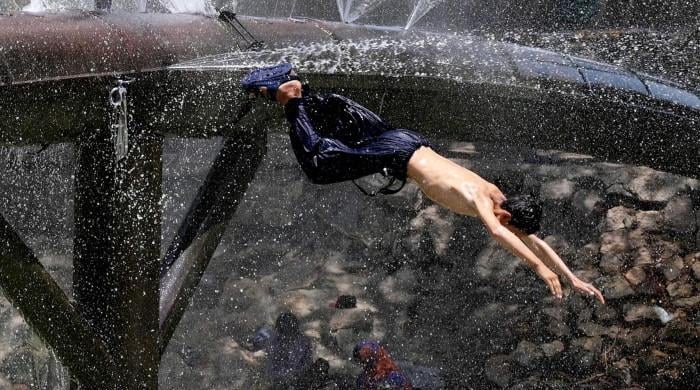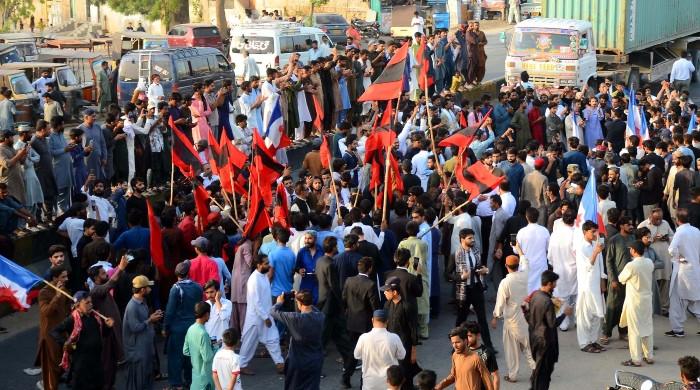PM Shehbaz announces 'magnificent' relief package for farmers worth billions of rupees
Govt allocates subsidies for farmers, tubewell owners; it will provide 1.2m bags of wheat seeds to farmers free of cost
October 31, 2022
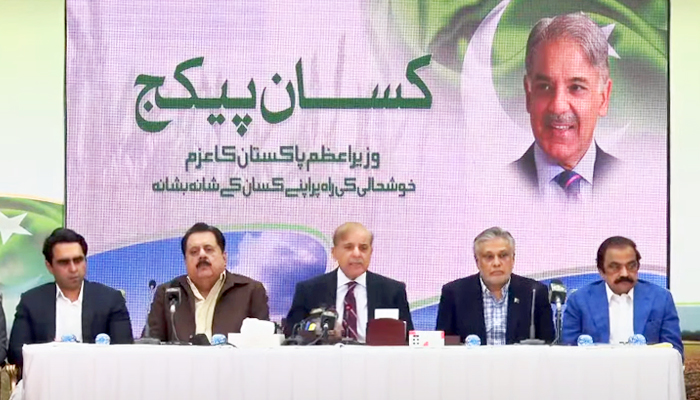
- Govt allocates subsidies for farmers, tubewell owners.
- It will provide 1.2m bags of wheat seeds to farmers free of cost.
- Plans to import second-hand tractors for farmers.
ISLAMABAD: Prime Minister Shehbaz Sharif Monday announced a relief package worth billions of rupees for farmers after cataclysmic floods badly hit the agricultural sector.
"I have come to terms with the fact that the country's progress is directly proportional to the development of Pakistan's agricultural sector," the prime minister said while addressing a press conference alongside federal ministers and members of the government's economic team.
Unprecedented flash floods caused by historic monsoon rains have washed away roads, crops, infrastructure and bridges, killing over 1,700 people and affecting more than 33 million, over 15% of the country's 220 million population.
Final estimates put the damage from Pakistan's recent deadly floods at more than $30 billion, the planning ministry’s Post-Disaster Needs Assessment (PDNA) report stated, adding that the reconstruction needs are over $16 billion.
According to the report, agriculture, food, and livestock suffered losses worth $3.7 billion (Rs800 billion).
Climate-induced flooding across Pakistan has destroyed agriculture resulting in a decrease in the production of major crops. Sugarcane production has been reduced by 8%, rice by 40.6%, and cotton by 24.6%.
The premier said for the ongoing fiscal year, the government will provide loans worth Rs1,800 billion to the farmers — four times more than the preceding year.
"As you all know, the incumbent finance minister [Ishaq Dar] is quite strict [...] and he will ensure that all the amount is provided to the farmers," PM Shehbaz said, highlighting that the commercial banks avoid giving loans to small farmers and entrepreneurs and look for secure investments.
The PM said the markup on the loans taken by farmers belonging to flood-affected areas had been waived off and for this, the government has allocated nearly Rs11 billion.
The Centre and smaller provinces will also provide more than Rs8 billion to small farmers in flood-affected areas, he said, adding that the government would also provide loans worth Rs50 billion to youngsters living in rural areas and are willing to become professional farmers.
Loans for tenant farmers
He said that the loans to youngsters would be provided on a markup less than the market rate and the government will set aside nearly Rs6.5 billion for this venture.
The prime minister announced interest-free loans for tenant farmers in flood-hit areas. “Subsidy worth Rs5 billion have been allocated for these loans,” PM Shehbaz maintained.
In addition to this, the government increased the value of Produce Index Unit (PIU) from Rs4,000 to Rs10,000 for obtaining loans for agriculture purposes.
He maintained that they would promote small and medium enterprises (SMEs) in agriculture as Rs10 billion have been allocated for the SMEs’ modernisation scheme in the agriculture sector.
Subsidy on urea, DAP
Sharing further details, the premier announced that following a tough negotiation with the government, the fertiliser plants have agreed to slash Rs2,500 per bag on Di-ammonium phosphate (DAP) — the DAP bag will now be available at Rs11,250 in the market.
Earlier the DAP bag was being sold at around Rs14,000.
In collaboration with the provinces, 1.2 million bags of certified wheat seeds would be provided to farmers in flood-ravaged areas free of cost, the prime minister said, adding that Rs13.20 billion were allocated for the programme. Of the Rs13.20 billion, 50% would be provided by the Centre, he added.
He further revealed that the government has planned to import 500,000 tons of urea out of which 200,000 tons have already arrived in Pakistan.
The PM praised the industries minister and his team for negotiating the deal in a manner that helped the government save $100 per ton — as under the government-to-government deal urea was available at $600 per ton initially but because of the constant efforts of the authorities concerned price was brought down to $500 per ton.
“In order to strengthen the agriculture sector of Pakistan, the government has also decided to allocate Rs30 billion as subsidy on urea so that the small farmers can get the fertiliser at cheaper rates.
Govt decides to import second-hand tractors
The premier lamented the tractors locally manufactured in Pakistan cannot be exported because of the ban imposed; which has also increased the cost of tractors for the common farmers.
“I along with Dar and other authorities concerned tried to end the monopoly of the tractor industry; however, the stakeholders straight away refused to cooperate with the government,” PM Shehbaz said, adding that keeping this situation in mind the government has decided to import second-hand tractors.
The prime minister said that the government, out of obligation, has decided to import up to five years old second-hand tractors (with proper certification) in order to help farmers who cannot afford the locally-manufactured tractors.
He clarified that had the tractor industry cooperated with the government they wouldn’t have taken this decision, which is expected to dent the local industry. The premier also announced that a 50% rebate on duty will also be given to those importing these five-year-old second-hand tractors, a 36% rebate on three-year-old tractors, and the concession rates will be calculated accordingly.
Govt decides to import 1.6m tons more wheat
The prime minister said that while previously wheat was being imported because of below than average production, Pakistan would still need to import wheat because of the devastations caused by the floods.
He said that the government has decided to import 1.6 million tons of wheat which takes the total number to 2.6 million tons out of which one million tons have arrived.
Clarifying why did he not allow private sectors to import wheat, he said that the government is trying to save each dollar and provide people relief which is why all wheat import deals were government-to-government
Interest-free loans for tube well owners
Regarding relief on electricity prices, he said that the government has decided to provide interest-free loans to the owners of 300,000 tube wells, currently operating in Pakistan. The plan is to solarise these tube wells.
He elaborated that the farmer won’t have to pay electricity bills and will only have to pay the instalment while the government will pay the interest amount.
The premier said that the government has decided to take a fixed cost of Rs13 per unit as an “immediate” relief to the farmers — which means a subsidy worth Rs43 billion will be given.





